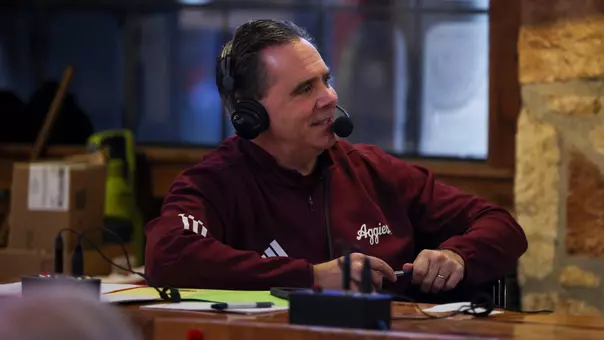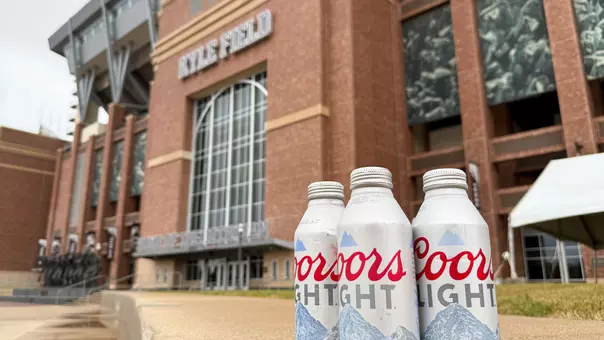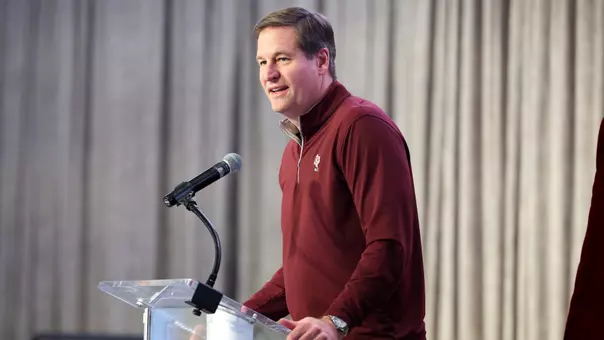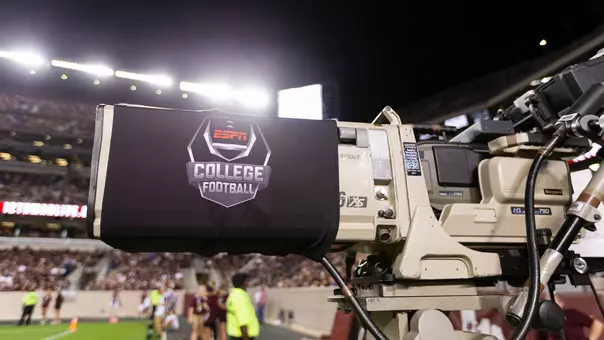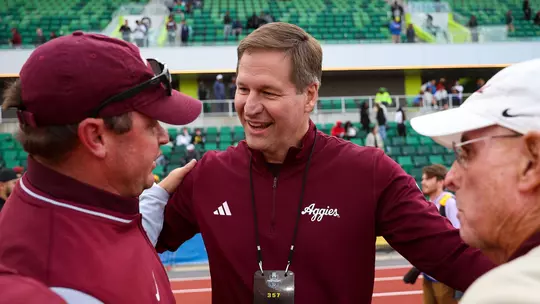
Summer Sit-Down: Trev Alberts
On the latest episode of Summer Sit-Down on the Studio 12 Podcast, Texas A&M's Director of Athletics stopped by and caught up with Andrew Monaco and Will Johnson. The group discussed the offseason successes of Mike Elko and Bucky McMillan, the beginning of the revenue sharing era in college athletics, enhancements coming to Kyle Field this fall, Trev's memories of working on a farm growing up, some of his favorite moments playing football at Nebraska and much more.
You can read select quotes from the conversation and listen to the entire episode below.
On Summer plans before the seasons kick in to high gear…
(Summer's) going great. We haven't had a chance to do that yet, but looking forward to it. Over the Fourth we're going to head up to Iowa to see my dad. I've got my brother and sister and their families, so a bunch of grandkids, nieces and nephews. We're all going to gather there in Cedar Falls, Iowa. We'll go out to the farms, and they don't look a lot different than 17 years ago. The corn will be about this high, and it's not quite tasseling. And the beans will either be dirty or we need to get them sprayed, you know? So it's kind of the same conversation, but it's just good to see family and recharge a little bit.
We've been running hard. The reality though is everything's a competition as I've often thought, and I understand we all do need to get away, but the summer is a chance to kind of make a little progress on the people you're competing with. Because now is our time when we're really thinking hard about next year. There's so much about what we're trying to do--fair market value, NIL stuff--how are we setting that up? Our recent hire in that space was in town, he officially starts July 14th. (We’re) Setting him up with head coaches through email and cell phone. So there's still an awful lot there. There's a lot of opportunity. We think a lot about what our experiences are like at our athletic venues. What are we looking at in terms of revenue? All of the business never really stops. And so there's a lot of planning and preparation, but it is a good time to kind of pause and reflect and recognize that when that first game against UTSA kicks off, we won't breathe for several months.
On the start of Bucky McMillan’s tenure in Aggieland...
Just a lot of positivity, right? You guys have experienced that a little bit too. And that's easy when you haven't coached a lot of games and there isn't anybody upset about what some of the win/loss records look like. But I will say, and this is not negative or sitting in judgment of any past leadership, but the reality is when you make changes or when changes happen to you, you get a chance to kind of pause and reflect and look at what the future looks like. And you get to modernize in a sense. Everything that we talked about, everything that we'd kind of hoped that he would be about in terms of his willingness to get out and engage, he's been a dream for the administration, frankly. He still has a lot to learn, too. He'll be the first to tell you that. He's a young basketball coach and there's a lot of nuance to a place like Texas A&M. The scale of the place and the people add to some of certainly the benefit but also the challenge.
I thought he was really, really intelligent in who he hired as his assistant coaches--people that have been in the community, they understood the culture. But it's just really cool. He's been very appreciative of the opportunity. He's been great to work with. And our donors have recognized...you don't have to be here very long to figure out if you're not willing to sort of embrace and engage the culture and talk to people, it's going to be hard here. This is a place that wants to see, touch, feel. I think authenticity really matters in terms of leadership, both as coaches and others, and genuineness. And I think that Bucky has that in spades. He’s worked extraordinarily hard. And he would tell you a lot of people helped him. I mean, a lot of people worked really hard with him. But he's got an exciting roster and we're pretty excited. I think the future looks very bright in our men's basketball program.
I will tell you he's been great to (women’s coach) Joni (Taylor). Let's not forget about that when you have two programs that close and interconnected in so much stuff, they can really benefit each other. And then I would continue to tell you that I think that the guy who is really a catalyst of our culture change in leadership is Mike Elko. Mike is kind of a coach's coach. He's been at it a while. I think they respect him. And his leadership as the head football coach here is paying extreme dividends to the rest of our coaches. There's a camaraderie and a chemistry right now that's happening with our head coaches that's really cool to see. But people have to lead. Bucky and Coach Elko and a lot of our coaches are going to be great in that area.
On the recruiting successes for Mike Elko in the Summer...
Well, they're not done...But look, you know, I just think it goes back to authenticity. Genuineness. I've had a chance to go to a couple of those recruiting events. There'd be a couple of student-athletes they were recruiting, maybe from the Midwest, and (I’d) have a chance to say hello to them. But his leadership is really showing through. I think the overall coordinated strategy around recruiting still really matters. You're in a rev share era, so there's a little bit of a transactional nature to it. But you combine that with a real plan, a communicable strategy and vision around how the football program is going to win championships...you add that to the facilities that have been created here through our generous donors...playing in the Southeastern Conference...I mean, you're going to have to have a pretty remarkable opportunity to think past Texas A&M. This is elite. And Mike's leading the way.
I've had a chance to listen to all of what they're selling. Again, it's genuine. It's real. It's not just football. It's the total person development. That kind of stuff matters to moms and dads and grandparents and other people. So, again, I just think Mike has worked really, really hard at it. I'm excited about the future of our football program. I'm excited for Mike because when you work that hard you're hoping to get rewarded. Obviously it comes down to wins and losses on the football field, but you're only as good as the players that you have on your roster. I'm not very smart, but I will tell you I have been able to figure out that the teams that have better players generally win. So we're going to try to have better players.
On how the Aggies have been able to retain a large number of players and how that can lead to success...
I think it's hugely important. And I think that's why some of the national folks are looking at Texas A&M and going, oh my gosh, what kind of production do they have coming back on offense? And I'll just say this. If you want to judge the trajectory of a program, first of all, you have to understand what the culture is. Because you can talk about all these rankings and stars and stuff...at the end of the day, football's kind of a pretty simple sport. It really is one man moving another man against his desire. It's kind of a gladiator, right? And so football makes you do things that you ordinarily as a human aren't interested in doing. It is not natural for most people. It is not natural for most people to say, hey, I'd like to get on the kickoff team, I'll run as fast as I can, and slam into another human. So the culture is so important because if you're forcing yourself to do stuff that you ordinarily don't want to do and you have a bad culture, you're not going to do it.
In a world that had unlimited ability for movement and players’ chances at revenue prior to the House settlement because of the nuance of that, how many guys transferred? Our guys stayed. And we had guys that could have declared for the NFL Draft that didn't. They wanted to be a part of this. That tells you everything. And so to your point, Andrew, yes, you always have to bring in more players. But I think your ability in amongst all the noise, the rev share, the fair market, all this business stuff we're talking about...how well are you developing the players that are in your program? And I would tell you that I think that's one of Coach Elko’s strengths. I think you're going to see that. You're going to see Marcel Reed’s continued development. Obviously health and injuries and all those things, play in. But you’ve got an offensive line that’s got an awful lot of starts. And that's really important. And so I am very, very much encouraged. Obviously we have some pretty difficult road games. But we're not going to get out cultured. Mike Elko is not going to get out cultured. We’ll run into teams that have as much talent as us, and sometimes the ball bounces wrong where we get an inopportune penalty. But this is a football team that is going to fight and it's going to never quit. And it's going to be very physical and they're going to be together. And if that's not part of who they are, they won't be part of this program. I have enough confidence in that in watching Mike Elko. They won't make it here. Winning programs demand that level of accountability and that standard. And that's what Mike is creating. That's why I'm encouraged.
On some of the changes or new things fans may see at Kyle Field this Fall...
Well, we're hoping that there's some slight changes and we'll kind of detail those out here in a little bit. I will tell you that I think what's fascinating about Texas A&M, as somebody who hasn't been here a long time, what you all have done to build this cathedral is just truly remarkable. Having the opportunity to go to those home football games last year and just for the first time experience Kyle Field in that manner, with all of the traditions...(my wife) Angie and I had the chance to take the Yell Leaders out to dinner, and just what they bring to the environment and all of that is just spectacular.
But we always have to think about (the fact that) our entire Athletic Department runs on those seven home football games with 102,000 people there. Obviously the product on the field is number one. You just have to have a team that plays in a way that reflects the values of Aggies, and I believe that's what Mike Elko is bringing. It's the style of play. It's the effort, it's physicality. It's doing things the right way. It's being fundamentally sound. It's not hard. You don't have to win every game. We'd certainly like that. But it's how you play the game, right? But beyond that, what are we doing to ensure that the experience in Kyle Field is not similar to what you can get just sitting in your own basement? And so we always have to think about those things. First of all, I think the halftime presentation from the from the Aggie Band is unbelievable. I think that's unmatched. You just can't miss that. I'll tell you what it it's just so precise and so perfect and so awesome.
But there's just little things in the overall experience, and as time goes on and there's more technology, there's been an opportunity to rethink some of these things. We've always had great video boards and all of that. But you know, we don't have LED lights and we didn't have some Wi-Fi. So two things that we did choose to do this offseason: Sportsbeams is a company that we engaged with. We are going to have LED lights this year. And we've worked hard on some of the Wi-Fi and some of the technology. I'm not going to suggest it's going to be perfect, but what I'm saying is we're investing in areas to make sure that IT infrastructure is better. We want to make sure that we have those LED lights. And so we need to think about what is that game day presentation like? We're never going to move away from the traditions that make A&M A&M. But how do we integrate new stuff, new experiences in a way that doesn't conflict with that?
So you'll see LED lights this year. I think it's under construction as we speak, and we're working on that. That'll be really important. Now, I think some of our colleagues and some of our peers have maybe taken the LED lights...we're not going to be flashing lights after we get three yards on second down. We'll try to make it a little bit more. But you know what I'm saying. We're going to have to think that through. I want to say from the beginning we probably will have a couple fumbles early. So just know that this is all going to be new to us, too. That's for this year.
Obviously all of these types of projects have to go in front of the Board of Regents. We've had great support on our board and the leadership there. Bob Albritton’s leadership is really second to none, and Vice Chair Jay Graham. We'll have to bring this to the Board, but we also have video boards and all the ribbon boards, those types of things, that are sort of at end of life right now. So prior to the 2026 year, we'd like to have those all replaced with much better technology. And then we're going to take a hard look at the audio components of Kyle Field and how we make sure that everybody in the stadium can hear it. Then when you get all that kind of stuff done, you can have some fun with drone shows and fireworks and you can do lots of different things. I don't want to interrupt the football because people come for football. But I think there's some other things that we can integrate, whether it's after the game or between the third and fourth quarters, where we can do different things. We're going to continue investing in the technology that brings the fan and gameday experience to a level that stays at the leading front in college athletics.
On whether you can modernize without sacrificing tradition...
I think you can. I really do. I'm determined to do that because I really think you would be making a massive mistake if you tried to come in and say, you know what? Okay, that was great. That's the old Texas A&M. We're doing this now. It doesn't make any sense. I think every place has a uniqueness. And I think there's elements of what the game day presentation is like at Texas A&M, We just can't touch that. On the other hand, I think if you become lethargic and just kind of rest in your laurels...I think it can get stale. You're always looking for ways to just kind of advance it a little bit. Sometimes with the expectations, from other technology and other experiences at other venues, we have to adjust and adapt. And so I think that's where you're trying to meld those two together...And quite frankly, it's important to the players. It's important to their families. It helps in recruiting. So we've got to contemplate all that kind of stuff.
These decisions are never made in a vacuum by myself. But all of this is changing. We are now sharing 22 percent of our revenue, so we're going to have to think differently about how we generate revenue. You're going to see corporate logos on football fields, right? You're going to see a lot of things. But I wouldn't worry about it because at the end of the day there's still football being played on that field. And that's where the focus needs to be. And as long as that's good, I don't think the rest of it matters.
On the importance of modernizing and monetizing in 2025 and beyond...
It's critically important. You have to find ways. I remember early on in my tenure—I’m not acting like I've been here for 20 years, but you know what I'm saying--I met with the Board (of Regents). I love our Board. We have we have people who care desperately about Texas A&M. We (are in) an executive session just kind of walking through some of these changes that are happening in college athletics. And I said we really have three choices. Number one, we can sort of downsize our competitive expectations, relative success, in terms of all of our alumni. Nobody thought that was a good idea. Nobody said let's do that. And so that was number one. Number two, we can do nothing different, and then recognizing rising costs just ask our University to subsidize us or invest in athletics. I’ve got to say, General Welsh and his leadership team have been incredibly supportive of the Athletic Department and are all in to help us win, but there's limitations to that. Third, and finally, it's like, hey, what level of comfort do you have? There's revenue for us, we’ve got to go pick it up. It's laying there. I don't know how many years ago, 20 years or so, you probably would have never thought you would see some of the commercials that you see now. So the point is this. There is revenue there. We have to have the courage to go pick it up, modernize in those areas, because if we don't have the resources necessary we're just not going to be able to invest in a way that puts us in a position to be successful. Look, Mike Elko and his team are doing the work, but the recruiting that's happening, there's an investment there too, right? And those two things have to meld together. You've got to have the right vision, the right leadership, the right integrity, (the right) character of leadership. We have that in Coach Elko. And then there has to be a commitment from the administration, its donors and others--and the Board--to chase excellence, to unabashedly go get it. And I believe we have that alignment now. That's exciting to me.
On July 1 and the enactment of the House settlement being less a finish line and more of a hurdle that’s been cleared...
In all honesty, I think you said it right. It's the first hurdle. It feels like we have a little bit of clarity. I understand the trepidation. I understand those who would say, come on, this is just another bureaucratic effort that the NCAA is going to fail on. I really don't think so. Will it be perfect? No. Is there a sincere effort to try to bring some just common sense to college athletics? This unregulated market is in nobody's best interest. Now, Texas A&M is fine in it. But just to bring a sense of fairness and stability we need a durable system. And this is the first step, I think the right step, in creating the College Sports Commission. That ultimately brings a new governance structure that has clearly defined rules, real penalties that are enforceable and done in a way that everybody can buy into. It's going to be uncomfortable at first. Somebody is going to challenge it, somebody is going to get penalized. And we have to be successful in executing said penalty. And slowly you'll start to change the culture of college athletics, which today is, hey, what are the rules so I can find a way to skirt them? Pro sports don't think that way. Well, some did, but they were punished. The New Orleans Saints didn't get a coach for a year. The competition stayed the competition. It didn't branch outside of it where everybody's trying to circumvent this and that. And we need to spend all of our energies being on offense, being great, rather than circumventing things.
And so I think two things. I think the cap is more important than people really think about. A hard cap really helps a lot of things. People have been lamenting that you’ve got these transfer portals and unlimited (transfers). Well, in a hard-cap reality and world, it's going to limit transfers. In the old day, gosh, we love Will, but oh, Andrew's available? Let's go get some more donor dollars. Now we have both. A hard cap stops that. And the other thing it stops is if you make a mistake on Andrew--we had to have Andrew, so we went out and paid Andrew a million bucks. If we're wrong on Andrew now, that's dead cap weight. So you're going to have to really be thinking about that. Why? Here's why. Fifteen, sixteen months ago when the Texas A&M job’s open, and you're evaluating it, you first go, okay. Leadership really matters to me. Well we've got this four-star general. Seems like he kind of knows something about leadership. Yep, he does. Well in this new era, which is going to be really about evaluating talent and all this, I feel pretty good that Mike Elko with his intellect and understanding is the one leading the charge in this new world because it's going to be I think more important than ever before. It's a step in the right direction. It's not going to be perfect, but I think it's going to be really good.
And I think the final thing is the undefined. We're all going to have the same rev share. Not every school will be able financially to afford that. We're all going to have the opportunity to have increasing scholarships. Not every school will be able to do that, but in the end, the game is, is how do you get more fair market value on any deals done through NIL Go? What's your strategy? How do you leverage your scale? This is the hardest part of a place like A&M. We have all this excellence. It's all over, but a lot of it's in silos. How do we pull it all together and how do you leverage all of those assets? Because this is going to matter at the end of the day.
I'm back to recruiting Andrew. and Andrew's considering Texas A&M and XYZ school, three other schools. And every one of those deals...same scholarship, same quality of education, same rev share number. What's the differentiator? Well, A&M had a better strategy around getting approved fair-market value NIL deals. And by the way, Andrew, the last guy that played your position? He got another $100,000 a year because this place has the largest living alumni base in the Southeastern Conference, the most fortune 500 CEOs. And we've been able to with a real coordinated, successful, legal strategy around leveraging Texas A&M’s brand. Now, there are other schools, and you can guess who some of those are, that that can be equally successful. But this is our chance I think to really leverage all of those areas. Again, that's part of the modernization. How do you convince people and pull them in a direction that really pulls all of those silos and assets together for Texas A&M? I say it all the time, North Star. Every time a decision comes, hey, is this decision in Andrew's best interest? It’s in Texas A&M’s. And that's why we made the decision.
On being able to be proactive rather than reactive in the new era of college athletics...
I had a business mentor back in my days in Omaha, named Walter Scott Jr. He’s since passed away. A dear friend. But he mentored me for 12 years and he taught me about noise. And he said, Trev, when you get in a leadership position--he was telling me about his experience, Fortune 500 CEO, two different companies, Kiewit Corporation and Level 3 Communications--so much of it's just noise. And so many times if you're not careful, you can become paralyzed in fear by the noise. Or you spend all your time anticipating the noise and reacting to the noise. And you never go anywhere, because you're in this cycle of noise. And so how do you find a way to identify and recognize the noise is there? You can't act like it's not there, but you have to find a way to still do your job and to go forward and look forward. Recognize the noise is there, but I'm not going to focus on the noise. Because the people focusing on the noise are going to fall behind. You have to have the courage to not allow the noise to overcome you. And I think it was one of the benefits early in my career. We did some really hard things, and there was a lot of noise. And going through that experience has helped me in other cases, too.
Sometimes you’ve got to listen to the noise, but a lot of the times, a lot of the noise is just noise from folks who--they don't have any nefarious intent, they're just not well-educated. And that's what's been so hard about this because there's been so much nuance to this. I lived it every day on the implementation committee, and I'll be the first to tell you I don't know everything. It's hard to keep up with all the change. And so that's kind of the position that I've taken.

